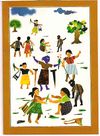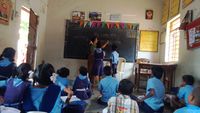Genesis ie Karnataka
Genesis of Inclusive Education in Karnataka - From Integration to Inclusive Education
Understanding of Inclusive education in general is to provide equal opportunities for learning of all children which includes any child having barriers to learning; they may be disabled or disadvantaged in the society. In the Indian context Inclusive education is referred mainly for children with disabilities.
Karnataka is one of the pioneering states to initiate Integrated education for children with disabilities which is now called as Inclusive Education. Including children with special needs in regular schools started since 1981 with implementation of IEDC scheme which started under the Social Welfare Dept in 1981.In 1983 the scheme was shifted to Dept of Public Instruction under the Directorate of State education and Research & Training (DSERT) Under this scheme, the role of resource teachers was critical for mainstreaming and providing resource support to children with disabilities in regular classroom situations. Consequently, a major emphasis was given to developing trained personnel and therefore pre-service and in-service training programmes were started for teachers in 1990. The pre-service training programme was a one-year multi-category certification course conducted by twelve non-governmental organisations in Karnataka. As the training is not recognized under the RCI Act it was discontinued from 2006 - 07.
Besides implementation of the scheme by non-governmental organisations, this scheme was also implemented and monitored by the District Institutes for Education and Training (DIETs). The DIETs trained regular teachers through 42 days training program for implementing the scheme.
Overview of IE as a part of projects of Education Department
The District Primary Education Project (DPEP)
In Karnataka, the DPEP launched Inclusive Education (IE) program in 1995 with the goal of ensuring education to children with disabilities. To achieve the cherished goal - Education For All, major emphasis was given on training of personnel in the existing education system with consultation of Seva-in-Action (SIA). A pilot project for initiating Inclusive Education was planned for a block by capacity building of the existing teachers and developing a participatory approach at the block level. Based on the study a pilot project was developed in Karnataka with major emphasis on capacity building of the existing teachers to implement Inclusive Education. The aim of the project was to develop Multicategory resource persons (MRP) at cluster level to implement Inclusive education.
Jan-Shala
In 1998, the Government of India along with five UN agencies implemented a block-based project in India called Janshala program wherein Karnataka was one of the states to implement it. The objective of the program was to ensure community ownership for education at school level. In Karnataka, the program adopted the DPEP model of inclusion where SIA trained 450 teachers covering 10 blocks. This program was implemented in the same 10 blocks as the Janshala, namely Sira, Madhugiri, Pavagada from Tumkur district; Arkalgud, Holenarsipura (H.N. Pura) from Hassan district; Hiriyur, Challakere from Chitradurga district; Honnali from Davangere district; Koppa from Chikmagalur district and Haliyal from Uttara Kannada district.
UNDP project
For the first time, two ministries worked in convergence, namely, the Ministry of Human Resource Development and the Ministry of Social Justice and Empowerment, to develop a program under “zero rejection” of children with disabilities in regular schools.
Inclusive education under SSA
Sarva Shiksha Abhiyan(SSA), which is the largest program of the Government of India to achieve the goal of UEE, also includes children with special needs. Unlike other projects of the GOI, SSA covers all the districts of Karnataka ie 32 education districts at present. Though the initial work of SSA started in Karnataka during 2001, a separate Directorate was constituted in 2003. The overall objective of inclusion education according to SSA is “ to ensure that every child with special needs, irrespective of the kind, category and degree of disability is provided meaningful and quality education. Hence SSA has adopted a zero rejection policy” (SSA P&I Manual 2003). Inclusive education is an important component under SSA but its area of activities was limited to identification, assessment through conducting medical camps and providing aids and appliances besides developing training manuals and Teaching Learning Materials (TLMs) in few districts. SSA has received impetus with appointment of 5 Inclusive Education Resource Teachers (IERT) per block. Out of five, three are regular teachers of the government with additional training on disabilities. The other two are single disability or multi category trained special teachers. With the budgetary allocation increasing to 3000/- per child per annum, IE has been given a significant importance to include children with disabilities in mainstream education system.
==Minority Department (Urdu and other Minority Language Schools) IEDSS Scheme== The Central Ministry of Human Resource Development initiated new scheme called Integrated Education for Disabled Children in Secondary Schools (IEDSS) with the main objective of providing equal educational opportunities for children with disabilities in the regular school system (covering children from 9th Std. to PUC) since 2009.
In Karnataka, like previous IEDC scheme, this IEDSS scheme is also being implemented through NGOs under the minority department of education. Under this scheme resource teachers are provided. Children are also given certain incentive like book allowance, equipment allowance, transport allowance, etc (Rs. 3000 per child per year).
‘Rashtriya Madhyamika Shikshana Abhiyana ‘ (RMSA)
From 2010, the Govt. of Karnataka is implementing a centrally sponsored scheme ‘Rashtriya Madhyamika Shikshana Abhiyana ‘ (RMSA) for Universalisation of Secondary Education in our State under SPD, SSA. The objective of this scheme is to achieve Universal Access and Quality Secondary Education. This new scheme is like Sarva Shikshana Abhiyana except its focus is on Secondary & Higher Secondary Education. The Govt. of India hopes IEDSS scheme will support RMSA in meeting the needs of children with special needs.
Karnataka Secondary Education Examination Board (KSEEB)
Concessions available for the children with special needs (CWSNs) in the Board Examination
The following concessions can avail on prior permission:
- . Extra time to write exam
- . Scribe for needy children
- . Pasting a green stickers on the SSLC Examination answer papers for CWSNs
- . Language exemption in SSLC examination for CWSNs
Directorate for Welfare of Disabled and Senior Citizens (DWDSC)
Special Schools The special schools for children with severe and multiple disabilities are located in urban and semi-urban areas and are being run by voluntary organizations with the assistance of State or central funds or few on their own. Most of these are residential schools and boarding-lodging and other services are provided free of cost. At present more than 100 special schools for the disabled are functioning in the State. Among them 8 special schools - 4 for Blind and 4 for Hearing impaired children are run by the Govt. (DWDSC). These special schools are monitored by the DWDSC.
This Department is also responsible for providing identification card for disabled persons scholarships pensions and other benefits as bus pass etc.
National Open School (NOS):
It provides education through an open learning system at the school stage as an alternative to the formal system for school dropouts, girls, mentally/physically disabled, etc. At present there are 4 NOS study centres in the State viz., Spastics Society of Karnataka, Brindavan Education Centre and Ashakiran in Bangalore and St. Agnes Special School in Mangalore.
Teachers Training Programs in Karnataka:
MCTTC in IED is stopped due to the issue of RCI recognition since 2005 in Karnataka.
Single disability training especially diploma/certificate courses on VI, HI, ID, LD & PD are being run by private schools/institutions in Karnataka (All India Institute for Hearing impaired, Mysore, Institute for Hearing impaired, Bangalore, Spastics Society of Karnataka, Sree Ramana Maharshi Academy for Blind, St. Agnes Special School, etc.)
CBR Network is running different courses on CBR in collaboration with Bangalore University and KSOU.
IGNOU also run some courses on disability.
At present Seva-in-Action is conducting need based training programs in inclusive education, early intervention, policies/legislations, etc. for Parents of children with different disabilities, Village Rehabilitation Workers, Community Education Facilitators, school teachers, volunteers, etc. It is providing resource support to the Govt. (both State & Central) in planning, developing training packages and conducting multi-category in-service training programs for teachers in IE.
In-service teachers training programs are going on under SSA on Education of children with special needs.

